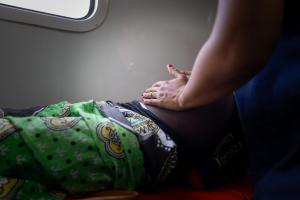Enhancing reproductive health services through on-site mentorship in Kenya
Kajiado County—At the busy Kitengela Hospital of Kajiado County in Southern Kenya, nurses Jackline Tabo and Grace Nyangweso bring healing in the quiet rooms where life’s most fragile moments happen. They are proud participants in WHO Kenya’s on-site mentorship, an initiative that’s designed to enhance the quality of sexual and reproductive health services at the point of care.
The mentorship initiative was rolled out in high volume facilities across six counties—Kajiado, Samburu, Marsabit, Tana River, Laikipia, and Siaya between March and May 2025. From Oloitokitok Hospital at the foot of Mt Kilimanjaro to Korr Health Centre in the deserts of Marsabit County, the 12 highly skilled mentors were able to provide structured, hands-on training to over 300 healthcare workers, equipping them with clinical knowledge and skills on Family Planning and Post Abortion Care.
The training included skills in short and long-acting contraceptive methods, provision of emergency care for post abortion complications, pain management and infection prevention during post-abortion care, counselling, and community engagement tactics.
Selected counties were informed by the presence of poor health indicators, with some of these challenges linked to the geographical and systemic constraints associated with arid and semi-arid lands contexts.
For busy healthcare providers like Jackline, the mentorship offered practical, real-time learning opportunities that she needed.
“There was minimal service interruption, and our clients were happy because usually when training is conducted away from the facility, the waiting time becomes longer for them and sometimes clinics are closed due to staff shortage,” she explained. “All staff had access to the sessions, and many found learning from experienced mentors particularly valuable.”
Grace emphasized the transformative impact of the mentorship on her clinical practice.
“I learned how to manage a wider range of post-abortion care scenarios, which previously might have required immediate referrals. I am now able to stabilize and support patients before considering referral for advanced or specialized care,” she said.
The mentorship contributed not only enhanced technical skills but also fostered teamwork, adherence to clinical protocols as well as improved confidence in service delivery.
With enhanced knowledge and confidence, doctors, clinical officers, and nurses are now better equipped to deliver timely, client-centred care, reduce service delays, and integrate family planning as a key component of post-abortion care services. This comprehensive approach is expected to significantly improve sexual and reproductive health outcomes across the six counties where WHO Kenya is implementing the initiative.
As these trained healthcare workers continue to champion reproductive health access in their communities, the ripple effects of the mentorship program are poised to make a lasting impact on the lives of communities.
